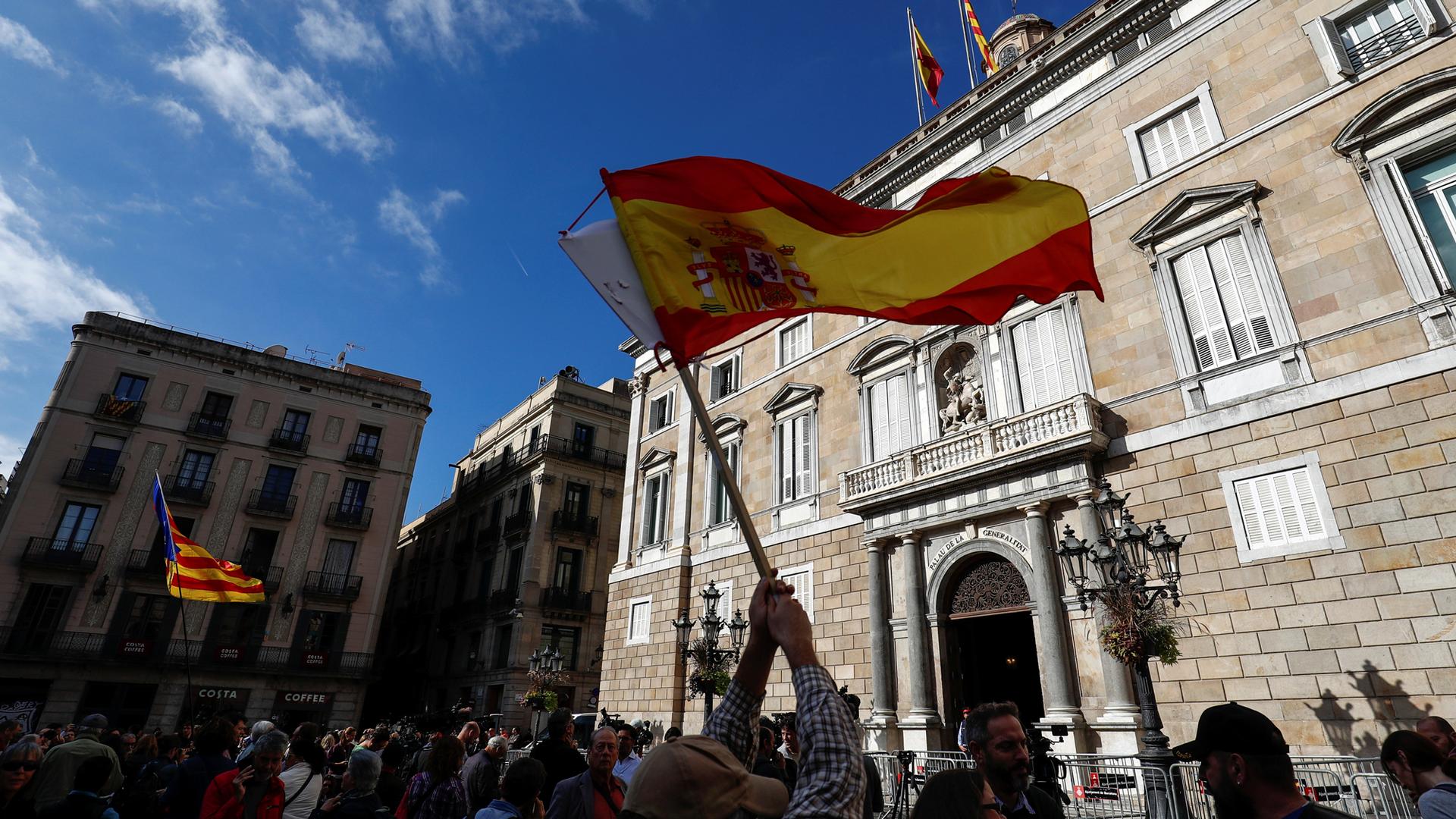Spanish prosecutors go after Catalonia’s axed leaders
Spanish and Catalan flags are waved in front of the Generalitat Palace, the Catalan regional government headquarters in Barcelona, Oct. 30, 2017.
Catalonia's dismissed separatist leader Carles Puigdemont was in Brussels on Monday, a Spanish government source said, as prosecutors called for him to be charged with rebellion over his drive for Catalan independence.
In response, Puigdemont's party announced it will now run in a December regional election called by Spain's government.
"We will go to the polls on (December) 21. We will go with conviction and with a commitment to letting the Catalan people express themselves," Marta Pascal, spokeswoman for the PDeCAT party, told reporters.
Spain's chief prosecutor said he was seeking charges including rebellion and sedition against the Catalan leaders, sacked by Madrid on Friday. Rebellion is punishable by up to 30 years in prison. A court now has to decide whether to accept the case against the leaders and bring charges.
On Sunday Belgium's immigration minister suggested Puigdemont could receive asylum in Belgium on the grounds that he might not get a fair trial in Spain. Belgian Prime Minister Charles Michel later insisted that was "not on the agenda."
Puigdemont on Saturday urged "democratic opposition" to Madrid's effort to take control of his region.
Clear your desks
Puigdemont maintains that the result of an independence referendum on October 1 — outlawed by Spain's top court — gave the wealthy northeastern region a mandate to declare it was seceding from Spain.
Catalan police, now under orders from Madrid, have been told they can allow the dismissed leaders to enter the government headquarters in Barcelona, but only to clear their desks.
One member of the dismissed government, Josep Rull, tweeted a photo of himself "at the office" doing his job as a regional minister. Press reports said he left again shortly afterward.
Late on Friday the Spanish Senate gave Madrid the power to impose direct rule on Catalonia under Article 155 of the constitution, the first time this so-called "nuclear option" has been applied.
That followed the unilateral declaration of independence by Catalonia's parliament the same day. Madrid took control of key powers and fresh Catalan elections were called for December 21.
A spokesman for Puigdemont's party PDeCAT said Monday that it would take part in the election. There had been speculation that it might boycott the vote.
'Psychological war'
Puigdemont's deputy Oriol Junqueras this weekend called Madrid's move a "coup d'etat," defiantly still signing off in a Catalan newspaper as the region's "vice-president."
But the international community including the European Union, struggling with Brexit and other challenges, has largely spurned the independence declaration and has united behind Madrid.
Donald Tusk, EU president, said Friday that Spanish Prime Minister Mariano Rajoy, 62, "remains our only interlocutor."
Spain's Foreign Minister Alfonso Dastis told Britain's Sky News on Sunday it was "hard to see" how Puigdemont and the others would go on government, saying that "reality is sinking in."
Sergi Sabria, a spokesperson for the separatist ERC party, appeared to agree on Monday, saying: "For now our republic is not fully able to impose itself the way that we would like."
But Sabria said that they would not give up and a separatist source described the situation as the "beginning of a psychological war" with Rajoy's government.
"What we have to do is to resist Article 155, in a symbolic manner of course, and to show that the (Spanish) state's power here is weak and cannot totally impose itself," the source said.
Demo for unity
With its own language and distinct culture, Catalonia accounts for about 16 percent of Spain's population and a fifth of the eurozone country's economy.
After Friday's declaration of independence, Catalan lawmakers hugged and sang the Catalan anthem. The session was beamed onto giant screens outside and a crowd of 15,000 cheered every "yes" vote.
But on Sunday it was the turn of supporters of a united Spain, with hundreds of thousands taking to the streets of the Catalan capital Barcelona, waving Spanish and European flags and chanting "Viva Espana."
Municipal police said the crowd numbered about 300,000. Organizers said 1.3 million turned out and the central government's representative in Catalonia put the figure at one million.
The referendum "was an act of madness that has brought us to the brink," said Alex Ramos, the vice-president of Societat Civil Catalana, a group opposed to independence that organized the rally.
"The streets don't belong just to the separatists," he added.
by Daniel Bosque and Laurence Boutreux/AFP
The story you just read is accessible and free to all because thousands of listeners and readers contribute to our nonprofit newsroom. We go deep to bring you the human-centered international reporting that you know you can trust. To do this work and to do it well, we rely on the support of our listeners. If you appreciated our coverage this year, if there was a story that made you pause or a song that moved you, would you consider making a gift to sustain our work through 2024 and beyond?
